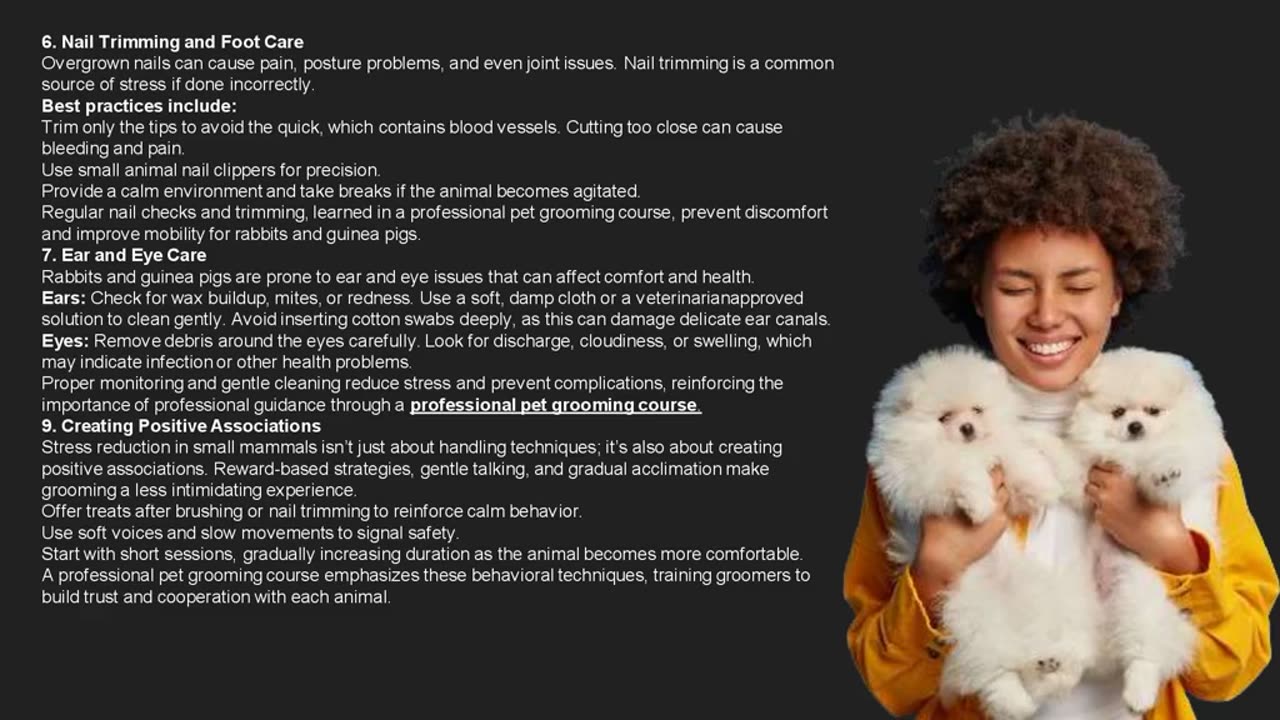Premium Only Content

A Quick Guide to Grooming Rabbits and Guinea Pigs Without Causing Stress-The Pets Workshop
Small animals like rabbits and guinea pigs are beloved pets in many households, yet they are often overlooked when it comes to grooming education. Unlike dogs or cats, these small mammals have unique anatomical and behavioral traits that make grooming a delicate task. Mishandling or misunderstanding their needs can lead to stress, injuries, or long-term health issues. For pet owners and aspiring groomers alike, understanding how to care for these “unseen clients” is essential. A professional pet grooming course Singapore provides the structured knowledge and hands-on experience necessary to handle small mammals safely, ensuring their comfort while maintaining their hygiene and well-being.
This guide outlines key principles, techniques, and tips for grooming rabbits and guinea pigs without causing undue stress.
1. Understanding the Behavior of Small Mammals
Rabbits and guinea pigs are prey animals, naturally alert and easily startled. Their instinctual behaviors — freezing, thumping, or sudden jerks — can make grooming challenging. Recognizing these behaviors is the first step in reducing stress.
Rabbits: They are highly sensitive to handling. Excessive restraint can induce fear or even lead to injury, such as spinal fractures, due to their delicate bone structure. They prefer gentle support under the chest and hindquarters.
Guinea pigs: They are generally more social but can react defensively if frightened. Their small size and delicate limbs mean that sudden movements during grooming can be dangerous.
A professional pet grooming course emphasizes observing these animals carefully before attempting any grooming procedure. Understanding their signals — twitching whiskers, flattened ears, or rigid posture — allows you to anticipate stress and adjust your approach accordingly.
2. Preparing the Grooming Space
A calm, quiet environment is critical for stress-free grooming. Both rabbits and guinea pigs respond poorly to loud noises, rapid movements, or the presence of unfamiliar animals.
Key considerations for a grooming space include:
Low traffic area: Choose a quiet room away from other pets or household activity.
Non-slip surfaces: Small animals can injure themselves on slippery tables or floors. Place a rubber mat or towel on the grooming surface.
Temperature control: Rabbits and guinea pigs are sensitive to heat and drafts. Maintain a comfortable temperature to avoid overheating or discomfort.
Proper lighting: Adequate lighting allows you to see the animal clearly, reducing the need for abrupt movements that may startle them.
By preparing a stress-minimizing environment, you create conditions conducive to calm handling and effective grooming.
3. Essential Grooming Tools
Using the right tools is vital when grooming small mammals. Incorrect or makeshift instruments can cause discomfort, injury, or anxiety.
Recommended tools include:
Soft-bristled brushes: Ideal for removing loose fur without irritating sensitive skin.
Small grooming scissors: Rounded-tip scissors are safer for trimming delicate areas, particularly around the face, ears, and paws.
Nail clippers designed for small animals: Overgrown nails can cause pain or mobility issues, so proper clippers are necessary for precise trimming.
Fur combs and dematting tools: Used for long-haired breeds to prevent tangles and mats that can trap dirt or cause skin infections.
A pet grooming course Singapore trains participants to select and handle tools correctly, emphasizing safety and comfort for both the animal and the groomer.
4. Handling Techniques for Minimal Stress
Proper handling is central to stress-free grooming. Unlike dogs or cats, small mammals are fragile, and improper restraint can result in serious injury.
Rabbits: Support the chest with one hand and the hindquarters with the other. Avoid picking up rabbits by their ears or scruff. For longer grooming sessions, keep them on a secure, padded surface and limit handling time.
Guinea pigs: Place them gently on a flat surface or in a secure lap. Keep a firm but gentle grip to prevent sudden jumps. Avoid holding them upright for extended periods, as this can strain their spine.
Breaking grooming into short, manageable sessions can prevent fatigue and reduce anxiety. Gradually acclimating the animal to touch, brushing, and handling can create a positive association with grooming.
5. Brushing and Fur Maintenance
Brushing removes loose hair, prevents matting, and helps monitor the animal’s skin health. Frequency depends on the breed: long-haired rabbits or guinea pigs may require daily grooming, while short-haired varieties may only need weekly attention.
Key tips for stress-free brushing include:
Use gentle strokes following the direction of hair growth.
Avoid tugging on knots; instead, gently work them out with your fingers or a dematting comb.
Monitor the skin for redness, irritation, or parasites during each session.
A professional pet grooming course in Singapore demonstrates techniques for safely detangling fur and assessing skin condition without causing discomfort. These skills are crucial for maintaining the health and appearance of small mammals.
6. Nail Trimming and Foot Care
Overgrown nails can cause pain, posture problems, and even joint issues. Nail trimming is a common source of stress if done incorrectly.
Best practices include:
Trim only the tips to avoid the quick, which contains blood vessels. Cutting too close can cause bleeding and pain.
Use small animal nail clippers for precision.
Provide a calm environment and take breaks if the animal becomes agitated.
Regular nail checks and trimming, learned in a professional pet grooming course, prevent discomfort and improve mobility for rabbits and guinea pigs.
7. Ear and Eye Care
Rabbits and guinea pigs are prone to ear and eye issues that can affect comfort and health.
Ears: Check for wax buildup, mites, or redness. Use a soft, damp cloth or a veterinarianapproved solution to clean gently. Avoid inserting cotton swabs deeply, as this can damage delicate ear canals.
Eyes: Remove debris around the eyes carefully. Look for discharge, cloudiness, or swelling, which may indicate infection or other health problems.
Proper monitoring and gentle cleaning reduce stress and prevent complications, reinforcing the importance of professional guidance through a professional pet grooming course.
8. Bathing Considerations
Unlike dogs, rabbits and guinea pigs generally do not require frequent bathing. Water immersion can be stressful and may even be dangerous due to their sensitive skin and risk of hypothermia.
Instead, spot cleaning with a damp cloth or using specialized dry shampoos is recommended. Only bathe when absolutely necessary, such as for soiled fur or medical reasons, and ensure the animal is completely dry afterward. This approach prioritizes safety and reduces anxiety during hygiene routines.
9. Creating Positive Associations
Stress reduction in small mammals isn’t just about handling techniques; it’s also about creating positive associations. Reward-based strategies, gentle talking, and gradual acclimation make grooming a less intimidating experience.
Offer treats after brushing or nail trimming to reinforce calm behavior.
Use soft voices and slow movements to signal safety.
Start with short sessions, gradually increasing duration as the animal becomes more comfortable.
A professional pet grooming course emphasizes these behavioral techniques, training groomers to build trust and cooperation with each animal.
10. When to Seek Professional Help
While many grooming tasks can be handled at home, some situations require professional intervention:
Persistent mats or tangles that cannot be safely removed.
Suspected skin infections, parasites, or unusual lumps.
Chronic overgrown nails or dental issues that impact grooming.
Professional groomers trained in small mammal care can provide advanced services while ensuring minimal stress. Investing in such expertise helps maintain the health and happiness of your pet while avoiding accidental injuries.
Rabbits and guinea pigs may be “unseen clients” in the world of pet grooming, but they deserve the same care, attention, and expertise as larger animals. Understanding their behavior, preparing the right environment, and using proper tools and techniques are essential to stress-free grooming.
A professional pet grooming course Singapore equips pet owners and aspiring groomers with the knowledge and hands-on experience necessary to handle these delicate animals safely. By applying these principles, you can maintain your small mammal’s hygiene, comfort, and well-being while fostering a positive grooming experience. Ultimately, proper care ensures that these unseen clients live healthy, happy lives as cherished members of the family.
Visits us : https://www.thepetsworkshop.com.sg/
-
 LIVE
LIVE
Donald Trump Jr.
44 minutes agoFBI's Incredible Crime Crackdown, Plus my Message to ABC!! | TRIGGERED Ep.283
8,608 watching -
 LIVE
LIVE
BonginoReport
1 hour agoMusic Stars Go Viral For Anti-ICE Rants - Nightly Scroll w/ Hayley Caronia (Ep.157)
3,441 watching -
 1:05:06
1:05:06
TheCrucible
1 hour agoThe Extravaganza! EP: 55 with guest co-host Rob Noerr (10/16/25)
19.7K -
 LIVE
LIVE
Kim Iversen
1 hour agoSpotify Bans Nick Fuentes — But the Shift Can’t Be Stopped
1,357 watching -
 LIVE
LIVE
Robert Gouveia
1 hour ago🚨 John Bolton INDICTED!! Antifa Terrorists ARRESTED!! Shutdown Firings FIGHT!
1,011 watching -
 2:21:57
2:21:57
MattMorseTV
4 hours ago $60.07 earned🔴Trump's EMERGENCY Oval Office ANNOUNCEMENT.🔴
99.4K59 -
 1:08:13
1:08:13
Michael Franzese
2 hours agoEric Trump and Michael Franzese: When The Government Attacks Your Family (Exclusive Sitdown)
15.9K6 -
 1:20:43
1:20:43
vivafrei
4 hours agoLive with Shawn Farash! Trump Impersonator and Conservative Activist! Viva Frei Interviews!
108K37 -
 1:43:44
1:43:44
The Quartering
4 hours agoFat Acceptance Is So Over, Church Attendance Surges, Tim Pool Water, D&D Is Full Woke Trash!
118K25 -
 LIVE
LIVE
LFA TV
20 hours agoBREAKING: JOHN BOLTON INDICTED! | THURSDAY 10/16/25
1,236 watching